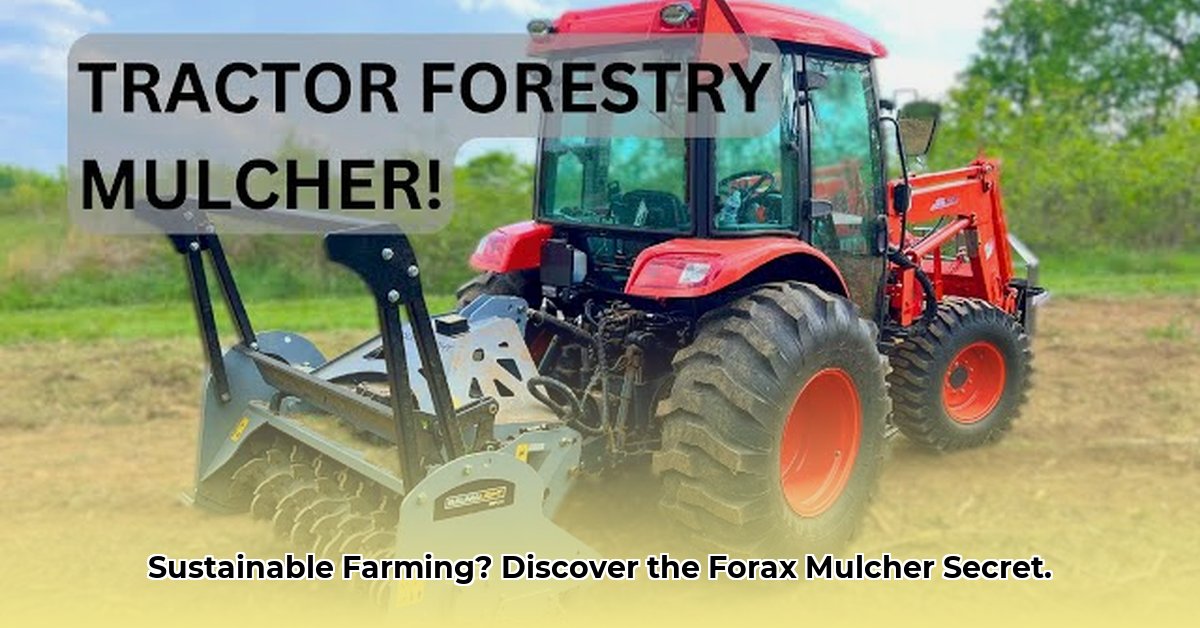
Forax Mulchers: A Deep Dive into Sustainable Land Management
Forax mulchers, powerful tractor attachments, are designed to boost farming efficiency and sustainability. For over three decades, Forax has been providing custom-built agricultural equipment, helping farmers optimize land management. But what distinguishes a Forax mulcher? Let's explore. For more information on similar mulchers, check out this helpful resource.
Getting to Know Forax Mulchers: Models and Applications
Forax offers a range of mulchers, each tailored to specific needs. This customization ensures the perfect fit for diverse farm challenges and land types. Larger models handle extensive areas and heavier debris, while smaller units are ideal for smaller farms or specific tasks. These are robust, durable machines built for longevity.
Understanding Forax Mulcher Specifications: What We Know, and What We Need
While Forax provides some specifications (weight, hydraulic requirements), crucial sustainability data is lacking. We need information on lifespan, maintenance schedules, and end-of-life management for a complete picture. This information is vital for farmers prioritizing environmentally responsible practices. The absence of detailed sustainability metrics from Forax hinders comprehensive comparisons and informed decision-making. Without this data, evaluating the true long-term environmental impact remains difficult. For example, while heavier-duty models require more powerful tractors, the resulting fuel consumption needs further quantification.
Here's what we do know:
| Model (Example) | Approximate Weight (lbs) | Estimated Hydraulic Flow (gpm) | Best Suited For |
|---|---|---|---|
| Model A | 800 - 1200 | 15 - 25 | Smaller farms and fields; lighter debris |
| Model B | 1500 - 2000 | 30 - 40 | Larger fields; heavier debris |
| Model C | 2500+ | 40+ | Very large-scale operations; tough conditions |
(Note: These are estimated values; exact specifications should be obtained directly from Forax.)
Sustainability Considerations: The Mulching Process and Operational Efficiency
While comprehensive lifecycle data on Forax mulchers is unavailable, let's consider the inherent sustainability benefits of mulching. Mulching reduces herbicide dependence, improves soil health by returning organic matter, and enhances moisture retention. However, operational efficiency significantly impacts environmental sustainability. Pairing the appropriate tractor minimizes fuel consumption. Regular maintenance extends the mulcher's lifespan, reducing waste and replacement costs. Aren't these key elements for a more sustainable farming future?
Operational Instructions and Best Practices: A Step-by-Step Guide
Optimizing your Forax mulcher requires careful attention to the following:
- Model Selection: Assess your land size, crop types, and debris density to choose the appropriate model.
- Tractor Matching: Ensure your tractor has sufficient power to avoid fuel inefficiency and operational difficulties.
- Attachment and Adjustment: Securely attach the mulcher and adjust cutting settings based on the material being mulched.
- Safety Precautions: Always prioritize safety by following operating instructions and wearing protective gear.
- Regular Maintenance: Adhere to a preventative maintenance schedule to maintain performance and longevity.
Case Studies and Potential Applications: Real-World Impact and Future Possibilities
While specific Forax case studies are currently limited, the potential applications of mulching are clear. From transforming overgrown land into productive fields to reducing wildfire risk, mulching offers substantial potential for sustainable land management. However, the lack of publicly available data means that demonstrating this potential within the context of Forax products requires additional information.
Conclusion: The Need for Transparency in Sustainable Agriculture
The agricultural machinery industry needs greater transparency. Manufacturers should provide detailed lifecycle assessments (LCAs) to empower farmers with the information needed for informed, environmentally sound decisions. Forax, and the broader industry, must prioritize data transparency to build trust and foster wider adoption of sustainable farming practices. This improved transparency is crucial for enabling responsible growth in the agricultural sector. Don't you agree that this data is essential for making informed decisions?